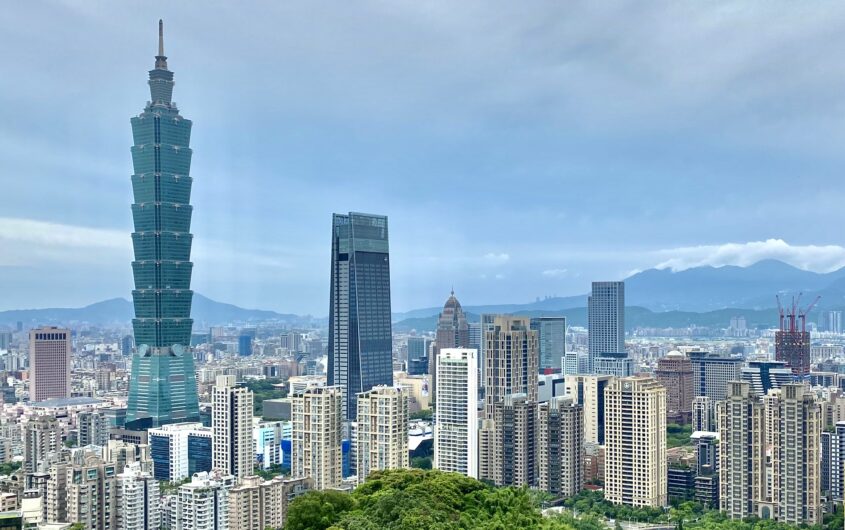
毛貓大少爺 via Flickr
Germany’s Juggling Act between Taiwan and China

Aaron Wheeler
Halle Foundation/AGI Intern
Aaron Wheeler is a research intern at AGI for the summer of 2023. He assists resident fellows with their research projects, manages databases, and helps organize and document events.
Mr. Wheeler is currently pursuing a bachelor’s degree in International Politics at Georgetown University’s Walsh School of Foreign Service. He is also pursuing minors in German and History. He is concentrating his studies on issues related to immigration and climate change policy within the European Union. He is also interested in transatlantic security and trade policy.
Mr. Wheeler completed his first two years of undergraduate school at the University of Pittsburgh before transferring to Georgetown, where he pursued a double major in Political Science and German with a certificate in European Union Studies.
In the past few years, the German government led by Olaf Scholz has shifted considerably Berlin’s policy regarding the Indo-Pacific region. Concerned by China’s expanding power and ambitions in the region, as well as the impact of Chinese economic and technology policy on German interests, political leaders and senior officials from across the spectrum have been scrambling to recalibrate Germany’s approach towards the troublesome superpower. In July, the coalition government released the country’s first-ever China Strategy, outlining in detail the federal government’s priorities going forward. This new agenda, one that focuses on hedging against an over-dependence on China and discouraging coercion in the region, has much in common with the policies adopted by other Western powers, such as the United States and European Union. While Germany’s main areas of focus include Beijing’s economic and technology policies and the PRC’s growing assertiveness on the international stage, a substantial part of their stake in the Indo-Pacific concerns Taiwan, an important democratic partner whose self-governing status has become increasingly jeopardized by Chinese military activity. The document reiterates Berlin’s one-China policy, which implies policy continuity, but it also states that Germany has economic and technological interests in Taiwan and that any military escalation in the Taiwan Strait would affect German and European interests. This directness represents a clear shift in Germany’s approach toward both Taiwan and China: Berlin intends to expand its relations with Taiwan while simultaneously preserving its strong economic partnership with the PRC.
Shifting Policies
Since 1990, Berlin’s ties with China have been defined mainly by a strong and growing economic partnership. In recent years however, this important relationship has hit snags as a result of Beijing’s increasing authoritarianism at home, its pursuit of asymmetric economic dependencies that grant China leverage over major trading partners, and its toughening rhetoric toward Taiwan backed up by a more assertive military posture. The Scholz administration has begun to shift towards a policy of “de-risking” from Beijing, which entails weaning Germany off of its dependence on China in case relations become antagonistic. Chinese monopolies on certain technologies and rare earth metals crucial to the German economy have become a worry in Berlin as relations between the two countries grow more contentious and China takes steps to limit exports of key raw materials. Highlighted in the China Strategy, Berlin will aim to diversify supply chains away from China so that Germany becomes less reliant in critical sectors and reduces the risk of future economic pressure from Beijing. The toughening policy toward China also has a security dimension: Germany sent troops to Australia for the first time to participate in joint military drills this summer, further underscoring an interest in security in the Indo-Pacific region. Drawing lessons from becoming too dependent on Russian energy resources, these new practices signal that Germany is searching for ways to prevent a repeat of its excessive dependency on a rival power.
German concern that the PRC could attempt to use military force to incorporate Taiwan has induced Berlin to rethink its policies towards the island. Though Berlin does not have formal diplomatic relations with Taipei, they do have “close and good relations with Taiwan in many areas and want to expand them.”[1] Yet advancing relations with Taiwan can prove delicate, as Beijing often retaliates against other countries’ attempts to draw nearer to Taipei. Nevertheless, the past eleven months have seen Germany take steps to deepen their partnership with Taiwan, despite the risks that such measures carry. Such measures have accelerated since October 2022: Germany has sent four separate delegations, three of them parliamentary, to Taipei—the first German delegation in four years. The most significant visit was a delegation led by Bettina Stark-Watzinger, the Federal Minister of Education and Research and prominent figure in the liberal Free Democratic Party (FDP). This March, she became the first German cabinet member to visit in twenty-six years, as well as the only European official at the ministerial level to make the trip to Taipei over the past seven years. These visits have served to deepen the already strong economic ties between the nations, but more importantly to exhibit solidarity for Taipei in the face of Chinese intimidation. The Chinese retaliation was notable: two months later, Beijing canceled at the last minute a visit by FDP Chairman and Finance Minister Christian Lindner to China. Despite this backlash, Germany has maintained that it values Taiwan as a democratic and strategic partner, showing a marked shift in Berlin towards more confrontational policies in the region.
A Precarious Position
In the decades following German reunification and the opening of the Chinese economy, the two nations’ respective economies have become increasingly intertwined. For Germany, its strong economic performance over the past twenty years has relied heavily on the economic partnership with the PRC: China has cemented itself as Germany’s most important trading partner outside the European Union for the seventh consecutive year, accounting for 11.8 percent of German imports and 7.5 percent of exports in 2021. However, this flourishing trade relationship has left Germany extremely dependent on China, and “the further China moves away from the norms and rules of the rules-based international order, the more critical dependencies on the Chinese market, also on the part of individual sectors or companies, can prove to be a problem.”[2] But the German government has no plans of severing its vital economic partnership with the PRC. Major German companies such as Siemens, BASF, and German automakers are highly reliant on Chinese markets, and they continue to expand their research and development (R&D) in the region, demonstrating the immense economic bets that leading German companies have made on China. Understanding the difficulties associated with de-risking from such an important market, the Federal Government has held “intensive talks” with these companies to reconcile the adversity surely to come. Addressing the PRC, president of the Federation of German Industries (BDI) Siegfried Russwurm explained that “we [German businesses] understand the present strong dependencies…and must increase our resilience,” drawing on the lessons learned from Russia’s invasion of Ukraine. With decoupling not on the table, Germany is changing the economic incentives in order to manage risks to the country that arise from the intense economic relationship, making companies assume greater responsibility. The German China Strategy outlines a new restriction on state-backed foreign investment guarantees to German firms (3 billion euros per company and country) and indicates stricter scrutiny in the future in issuing export credit guarantees.
“The further China moves away from the norms and rules of the rules-based international order, the more critical dependencies on the Chinese market, also on the part of individual sectors or companies, can prove to be a problem.” -German National China Strategy
So too is Taiwan’s economy vitally important to Germany: put bluntly in the China Strategy, “We also have economic and technological interests regarding Taiwan.” These interests were echoed by Minister Stark-Watzinger during her visit to Taipei earlier this year when she signed the Science and Technology Agreement, which will expand German-Taiwanese collaboration in areas like AI utilization, batteries, hydrogen energy, and, most importantly, semiconductors. Taiwan alone accounts for nearly two-thirds of the world’s semiconductor market share (and almost all of the most advanced chips), mostly by Taiwan Semiconductor Manufacturing Corporation (TSMC), a fabricator based an hour southwest of Taipei. These advanced chips are crucial across vast sectors of the economy, from automobiles to the internet, and are currently some of the most important technologies on earth. Most of the technologies required to manufacture the chips depend on components produced by German companies ZEISS and TRUMPF, which highlights Germany’s crucial role in semiconductor supply chains. Therefore, it is a top priority for Germany and the West that Beijing does not disrupt Taiwan’s semiconductor industry through force or economic coercion, lest they gain a monopoly on the chip industry. With the newly-minted Science and Technology Agreement, Berlin is both expanding technological exchange with Taiwan and symbolically strengthening relations through commercial cooperation. However, having received diplomatic backlash from China, Berlin will need to carefully assess how to increase economic cooperation with Taiwan going forward without provoking economically adverse Chinese retaliation.
Implications for the Future
The Scholz administration’s actions regarding the PRC over the past years send a strong message not just to Beijing and Taipei, but to the rest of the world: Germany will seek new ways to defend and foster its political, economic, and technological ties with Taiwan even as it pursues a broader de-risking agenda to manage Germany’s economic and technological exposure to China. With these policy adjustments, Berlin has taken a leadership role in the EU, and its political contacts with Taiwan place it in the vanguard of Western nations standing up to Beijing. Germany depends more deeply than nearly any other major power on the international rules-based order, and it is increasingly employing its significant resources and economic relations to work to avoid disruption of the status quo in the Indo-Pacific region. In expanding its relationship with Taipei, Germany is lifting the bilateral relationship to a new level, showing commitment in the face of Beijing’s pressure. This German approach is a harbinger of new dynamism in its attempts to rebalance its Indo-Pacific partnerships in an attempt to hedge against risk while also shoring up the regional status quo.
[1] Strategy on China of the Government of the Federal Republic of Germany
[2] Strategy on China of the Government of the Federal Republic of Germany









